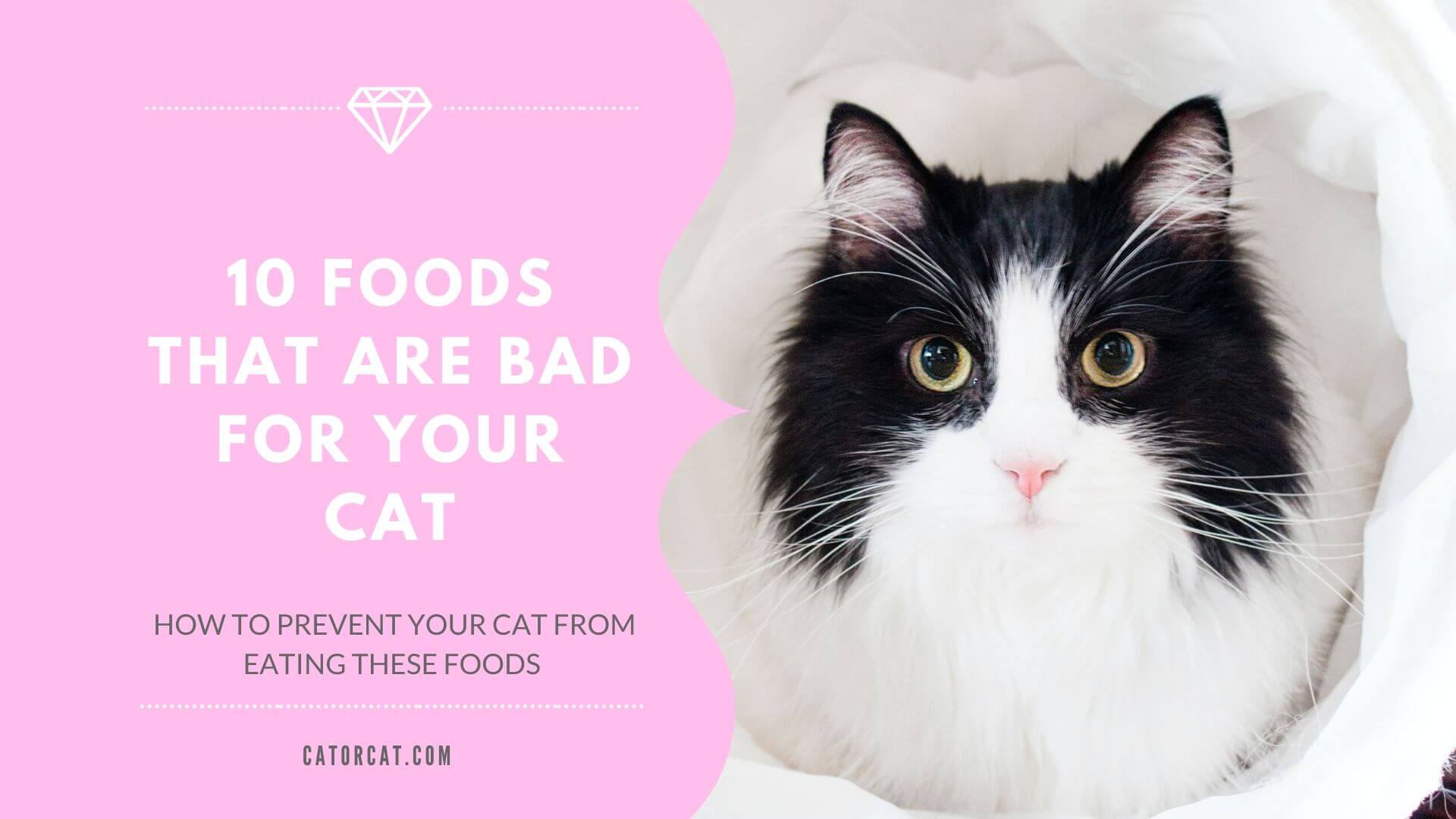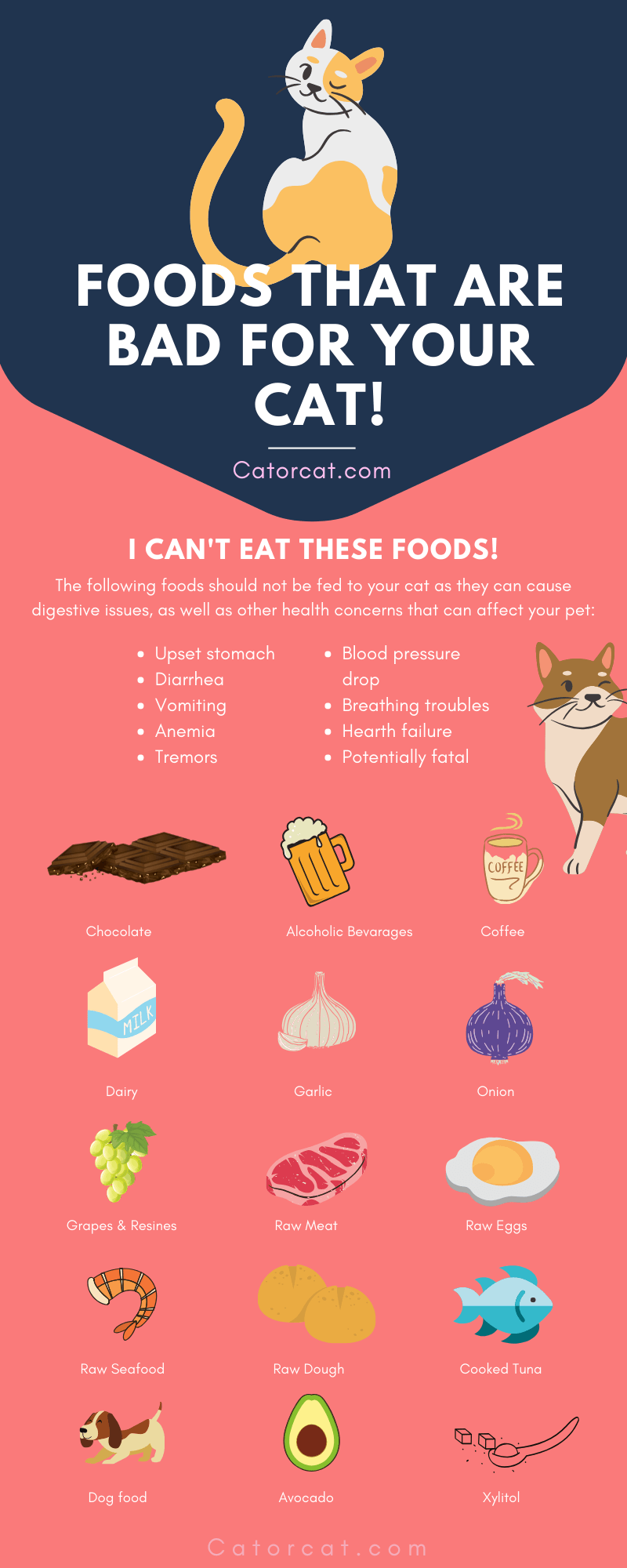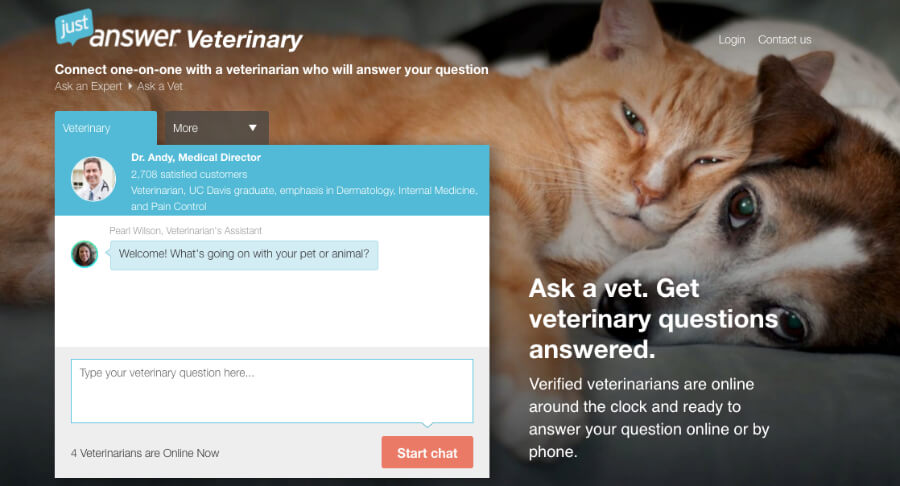
As cat parents, we love feeding our cats delicious and yummy food. From time to time, we love to give them special treats and table scraps that we think are tasty, and our cats will love but bear in mind that there is certain human food that is actually poisonous to them. We may think of giving them human biscuits, sweets, or chocolate as treats for our feline friends, but be wary. Some treats for humans are toxic for them, so knowing what kind of food is dangerous for cats is a must if you want to protect them and make them healthy. So let’s get right to it. Here are 10 human foods that are bad for your cat.
[Infographic] What can cats not eat?

What Human Foods are toxic for cats?
[toc]
1. Chocolate
Everyone loves chocolate, right? But not your cat. Chocolate is toxic to both dogs and cats alike. Chocolate contains theobromine, the bitter-tasting stimulant that causes ingestion problems in pets. It causes vomiting and diarrhea, causes blood pressure to drop, breathing troubles, and even heart failure. While you may be tempted to give them chocolate, please don’t. Theobromine is especially concentrated in dark and unsweetened chocolate. So keep those chocolate bars to yourself.
2. Alcoholic Beverages
Alcohol is especially toxic to cats. It can cause severe liver and brain damage, vomiting and diarrhea, tremors, disorientation, breathing problems, coma, and even death. Even small amounts of alcohol can cause a wide range of nasty symptoms. Do not leave your alcoholic beverages unguarded on tables and immediately clean any spills before your cat gets a chance to take a sip. Even a lick or two can cause big problems in cats.
3. Coffee
Any drink that contains caffeine is toxic to your cats. This means coffee, tea, and energy drinks. Your cat will be restless, suffer from heart palpitations, muscle tremors, and rapid breathing. It also causes hyperactivity and seizures in your cats.
4. Dairy
While the picture-perfect image of kittens often involves them surrounding a bowl of milk, the aftermath is usually never told. Cats cannot handle lactose in dairy products. Any milk and dairy products that come from cows, sheep, and goats should be avoided. Cheese and other products are also included. Vomiting, diarrhea, and dehydration are just some of the symptoms that cats are lactose intolerant.
5. Onions and Garlic
While it may be safe for cats to munch on soups and sauces that contain small amounts of onion or garlic, consuming a whole clove is toxic to them. Garlic and onions contain thiosulphate, a compound that can cause serious problems such as digestive upset, lethargy, weakness, reduced appetite, and pale gums. Excessive consumption can also attack your cat’s red blood cells, leading to anemia.If your cat shows any of the symptoms stated above, as well as orange to dark red urine, please bring her to a vet as quickly as possible.
6. Grapes and Raisins
Grapes and raisins cause acute kidney failure in dogs. Within 12 hours, vomiting can occur. And within 24 hours, lethargy, diarrhea, abominable pain, reduced urination, and reduced appetite can occur. While it’s not 100% sure if the danger to dogs poses the same threat to cats, the risk of kidney failure is too great.
7. Raw Meat, Raw Eggs, and Raw Seafood
Wild cats hunt their prey in the wild, so that means they eat raw meat, right? While we may be tempted to give them raw meat to mimic their natural diets, it’s not actually ideal. Raw meat from the supermarket has been exposed to the elements, packed, frozen, and transported. Raw meat bought from the store can have parasites and harmful disease-causing bacteria such as E.coli and Salmonella that can cause severe vomiting, diarrhea, and weakness in cats. And the worst thing? These bacteria do not respond to antibiotics! Raw eggs, on the other hand, contain an enzyme that can lead to skin and coat problems, leading to itchiness, allergies, boils, and cause your cat irritability. Raw seafood can also contain bacteria and parasites. Raw bones are also dangerous to your cat as they can puncture their gums, choke on them, and injure their digestive tract.
Related:
8. Raw Dough
When you’re baking, it is best that you don’t allow your cat to stay in the kitchen. Do not feed them raw dough as it contains yeast that can produce alcohol and carbon dioxide. Remember that alcohol is extremely poisonous to cats, and though raw dough does not contain alcohol, it can produce it when it reaches inside your cat’s stomach.Yeast can also grow or expand in the stomach, so big that it can require surgery to remove the digestive obstruction.
9. Cooked Tuna
While feeding your cat occasional cooked tuna is fine, giving her a strict tuna diet can be dangerous to her health. This is because your cat’s nutritional needs are far more complex than what tuna alone can provide. If you stick to a tuna diet, your cat can suffer from nutrient deficiencies, as well as suffer from mercury poisoning.
10. Dog Food
Just like cooked tuna, while dog food is not toxic to your cat, it doesn’t fulfill your cat’s daily nutrition needs. Dog food should never be a substitute for cat food as dogs can live on lower doses of nutrients compared to cats.Cats need plenty of Vitamin A, taurine, and protein, which most dog foods have lower levels of.
How to Prevent Your Cat From Eating These Foods
Cats are naturally curious and would eat anything sitting on your table. So when you’re done eating dinner, please make sure you store them so your cat won’t accidentally ingest anything that she’s not supposed to eat. When you’re cooking, do not let your cat sit and walk around the counter as she can unintentionally ingest some of your ingredients such as onions and garlic, yeast dough, and other food items that may be toxic for her. Another rule is that if you won’t eat it raw, it’s probably a good idea you don’t feed it to your cat, too.If you notice some symptoms in your cat that may be unusual, or if you suspect your cat may have ingested something that she shouldn’t take her to the vet immediately.
Buy pet insurance, to save money on the long run!
The Bottom Line
Whether you are a new cat parent or have had several cats for some time now, knowing what to feed them and what not to feed them is key to their health and survival.While we may be tempted to give them treats that we humans love to eat, sometimes, it’s not the best decision in the world to give them people food.Having the knowledge on how to feed and take care of your cat is key to preventing food poisoning, and helping them live longer and happier.
Related:

